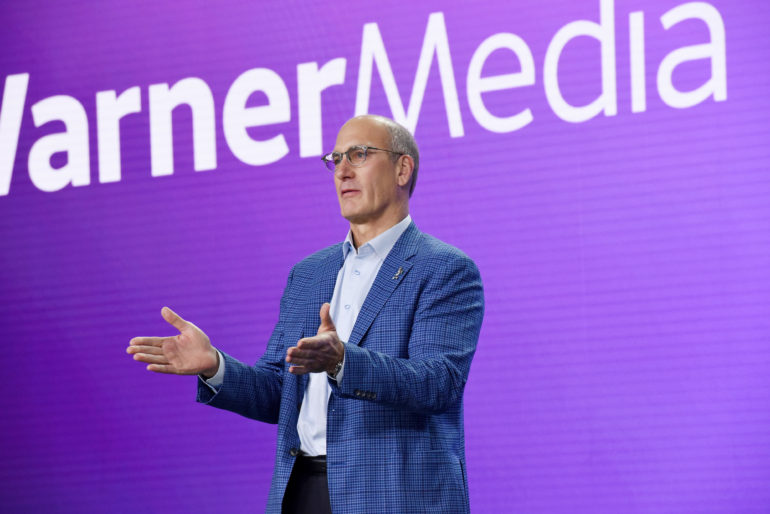Telecom giant AT&T announced Monday a deal to combine its content unit WarnerMedia with Discovery, paving the way for one of Hollywood’s biggest studios to compete with media giants Netflix and Disney.
Under the agreement, AT&T will unwind its $85 billion acquisition of Time Warner, which closed just under three years ago and form a new media company with Discovery. The deal would create a new business, separate from AT&T, that could be valued at as much as $150 billion, including debt, according to The Financial Times.
AT&T said it would receive an aggregate amount of $43 billion in a combination of cash, debt and WarnerMedia’s retention of certain debt. AT&T shareholders would receive stock representing 71% of the new company, while Discovery shareholders would own 29%, it added.
If approved by regulators, the deal effectively reverses AT&T’s years-long plan to combine content and distribution in a vertically integrated company. The companies said the deal is expected to close in the middle of 2022.
Shares of Discovery were up as much as 9% Monday morning, before flattening out about an hour after markets opened. AT&T’s stock price was up more than 3%.
AT&T said Discovery President and CEO David Zaslav will lead the new company, which will have a new name announced in coming days. The board would consist of 13 members, seven initially appointed by AT&T including the chair, and Discovery would appoint six members, including Zaslav.
“It is super exciting to combine such historic brands, world class journalism and iconic franchises under one roof and unlock so much value and opportunity,” Zaslav said, adding that AT&T and Discovery’s assets “are better and more valuable together.”
The new firm’s singular mission, Zaslav said, is “to focus on telling the most amazing stories and have a ton of fun doing it.”
However, the future of WarnerMedia’s current CEO, Jason Kilar, is uncertain. On a press call Monday morning following the announcement, Stankey said Kilar still holds his title, but it will be up to Zaslav to decide if Kilar still has a job with the new company.
AT&T owns CNN, HBO and Warner Bros. after it acquired Time Warner, since renamed to WarnerMedia. Discovery’s channels include Animal Planet, TLC and the Discovery Channel.
Zaslav said on the press call Monday that he believes the combined company will be able to differentiate itself from top streaming services like Disney+ and Netflix by offering a combination of news and sports on top of its entertainment properties like “Game of Thrones” and Harry Potter.
Zaslav also expressed confidence in CNN, which some had speculated would be spun off from WarnerMedia. Zaslav said Monday his new company plans to keep CNN with the intention “to take everything we have in news, combine it with CNN and be a world leader in news.”
Stankey and Zaslav said the two companies already spend a combined $20 billion per year on content, putting them in the same realm as Netflix, which currently spends about $17 billion on content per year. In an interview Monday on CNBC’s “Squawk on the Street,” Zaslav said he has a goal for his new company to reach up to 400 million streaming subscribers across the world, up from the 100 million subscribers the two separate companies have today.
Zaslav also said on “Squawk on the Street” that the deal was possible now after Stankey collected many of WarnerMedia’s various media properties under a single brand instead of selling its content to third parties like it had done before the AT&T acquisition.
“John had the vision to bring all that content together,” Zaslav said.
Zaslav did not provide concrete details for what the new combined company’s streaming offering will look like, but did say there will be a lot of flexibility. HBO Max is preparing to launch a cheaper, ad-supported version of its service in coming weeks. And Discovery+, which launched early this year, offers an ad-supported version as well.
“We’re going to do it differently,” Zaslav said. “We will have the flexibility here in the U.S. and around the world to determine how we create the ecosystem around this extraordinary IP … we’ll see over the next few years as we learn about what consumers want and how they want it.”
HBO and HBO Max reportedly have around 64 million subscribers worldwide. Discovery said last month it had reached 15 million paying subscribers.
By contrast, Netflix has around 208 million global subscribers, while Disney+ recently surpassed 100 million less than 1½ years after the streaming service launched.
The announcement came after reports over the weekend that the companies were in advanced talks to complete the merger.
— CNBC’s Alex Sherman contributed to this report.



